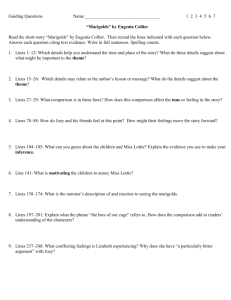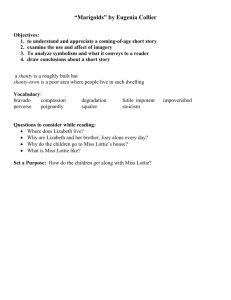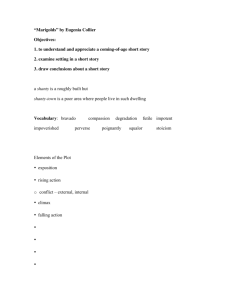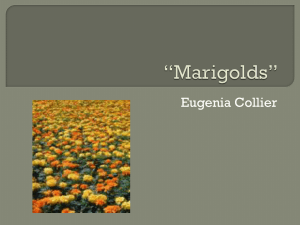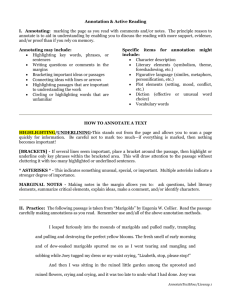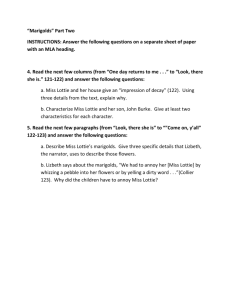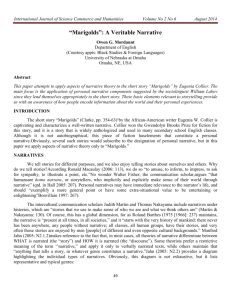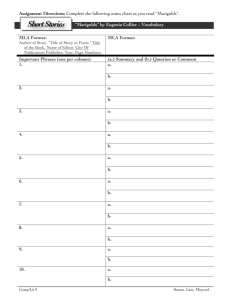Code Name - LEUSD Tech
advertisement
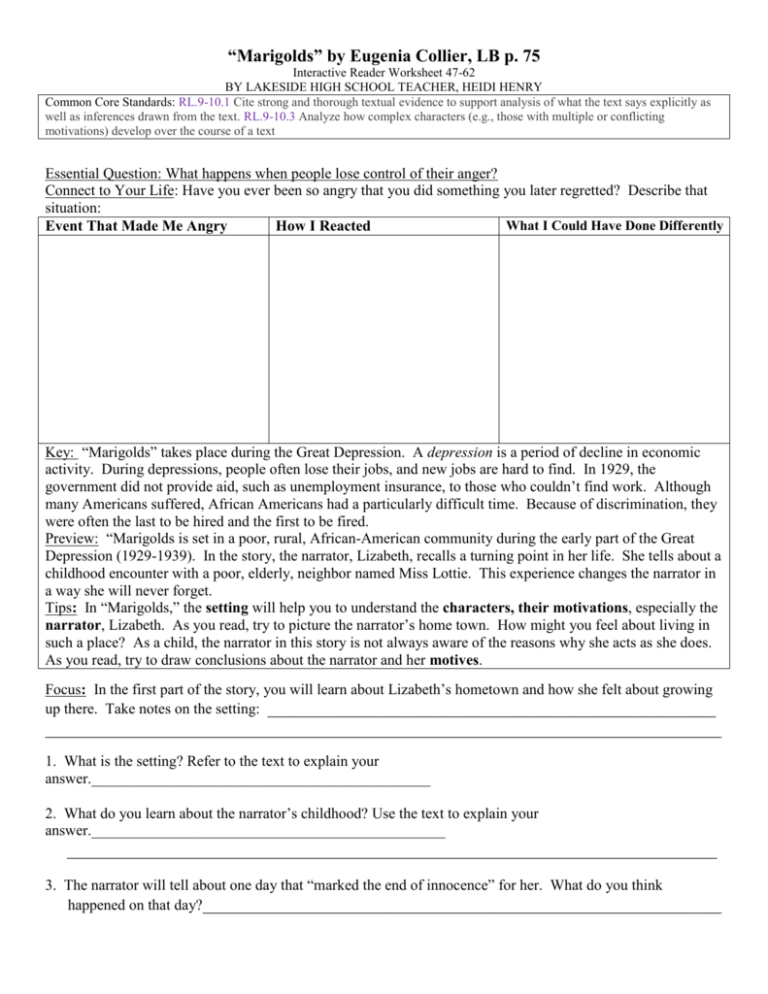
“Marigolds” by Eugenia Collier, LB p. 75 Interactive Reader Worksheet 47-62 BY LAKESIDE HIGH SCHOOL TEACHER, HEIDI HENRY Common Core Standards: RL.9-10.1 Cite strong and thorough textual evidence to support analysis of what the text says explicitly as well as inferences drawn from the text. RL.9-10.3 Analyze how complex characters (e.g., those with multiple or conflicting motivations) develop over the course of a text Essential Question: What happens when people lose control of their anger? Connect to Your Life: Have you ever been so angry that you did something you later regretted? Describe that situation: What I Could Have Done Differently Event That Made Me Angry How I Reacted Key: “Marigolds” takes place during the Great Depression. A depression is a period of decline in economic activity. During depressions, people often lose their jobs, and new jobs are hard to find. In 1929, the government did not provide aid, such as unemployment insurance, to those who couldn’t find work. Although many Americans suffered, African Americans had a particularly difficult time. Because of discrimination, they were often the last to be hired and the first to be fired. Preview: “Marigolds is set in a poor, rural, African-American community during the early part of the Great Depression (1929-1939). In the story, the narrator, Lizabeth, recalls a turning point in her life. She tells about a childhood encounter with a poor, elderly, neighbor named Miss Lottie. This experience changes the narrator in a way she will never forget. Tips: In “Marigolds,” the setting will help you to understand the characters, their motivations, especially the narrator, Lizabeth. As you read, try to picture the narrator’s home town. How might you feel about living in such a place? As a child, the narrator in this story is not always aware of the reasons why she acts as she does. As you read, try to draw conclusions about the narrator and her motives. Focus: In the first part of the story, you will learn about Lizabeth’s hometown and how she felt about growing up there. Take notes on the setting: ___________________________________________________ _____________________________________________________________________________ 1. What is the setting? Refer to the text to explain your answer._____________________________________________ 2. What do you learn about the narrator’s childhood? Use the text to explain your answer._______________________________________________ __________________________________________________________________________ 3. The narrator will tell about one day that “marked the end of innocence” for her. What do you think happened on that day?___________________________________________________________ 4. What questions or thoughts do you have about the story so far? ____________________________________ __________________________________________________________________________ Focus: On p. 78 the action now moves to an important day in the narrator’s past. Read to find out about Miss Lottie. Describe Miss Lottie’s life and surroundings: __________________ ___________________ ________________________ ________________________ __________________________ 5. Who is Miss Lottie? ______________________________________________________________________ 6. What do you learn about Miss Lottie’s life and where she lives? ___________________________________ __________________________________________________________________________ 7. The narrator says that the children like to annoy Miss Lottie. What do you think the children are going to do to her? Explain your answer. ________________________________________________________________________ Focus: At the bottom of p. 79, read to find out what the children do to Miss Lottie and why. How do the children feel about the flowers? How do you know? _____________________________________________________ 8. Why do the children hate the marigolds? How do you know? _____________________________________________________ __________________________________________________________________________ 9. What did the children do to Miss Lottie? ______________________________________________________ Why?______________________________________________________________________ 10. What is your reaction to their act of destruction?_______________________________________________ Focus: On p. 81 Lizabeth is upset by her actions toward Miss Lottie. Then, late that night, she overhears a conversation between her parents. Read to find out how this conversation affects her. 11. Why is Lizabeth’s father so upset? _________________________________________________________ __________________________________________________________________________ 12. Circle any of the following words that describe Lizabeth’s feelings after hearing her father cry and then explain your answers: confused relieved content scared 13. Lizabeth says she is going to Miss Lottie’s yard. What do you suppose she is planning to do now? __________________________________________________________________________ Focus: At the second column on p. 83 read to find out what action Lizabeth takes and how the experience changes her. 14. What did Lizabeth do after leaving her house?_________________________________________________ __________________________________________________________________________ 15. Look again at the last paragraph in the first column on p. 84. What change has taken place in Lizabeth’s feelings toward Miss Lottie?_________________________________________________________ __________________________________________________________________________ 16. Which character do you feel sorrier for? Lizabeth / Miss Lottie because__________________________ __________________________________________________________________________ 17. How do the children feel about their position in society? Think of their feelings and attitudes. __________________________________________________________________________ __________________________________________________________________________ Drawing Conclusions: Understanding literature requires readers to draw conclusions about events, causes of events, characters, and so on. In drawing conclusions, readers combine information from the text with their own prior knowledge. Note places in “Marigolds” where you find yourself drawing a conclusion that helps you understand the story. Use the chart. Drawing Conclusions About “Marigolds” Text Information Prior Knowledge Conclusion All the narrator remembers of her People remember pleasant The narrator didn’t have many hometown is the dust. (p. 75) experiences. pleasant experiences in her hometown. Setting: The time and place of the action of a story is called the setting. The setting often plays an important role in the plot and makes a strong contribution to the story’s overall impact and meaning. In some stories, the setting is simple and straightforward. In others, it can be more complex, taking place in a character’s private world of memory or feelings. Locate two passages from “Marigolds” in which the description of the setting seems to express the narrator’s feelings. Passage Feelings the Setting Expresses Passage 1 (page numbers ______________) Passage 2 (page numbers ______________) Underline vivid descriptive phrases in the passages on your chart. E.C. Use these phrases to create a poem. Words to Know bravado degradation impotent perverse squalor compassion futile impoverished poignantly stoicism A. Fill in each set of blanks with the correct word from the word list. 1) This is shown by a tiny dog who marks madly at a huge dog only when it’s on the other side of the fence. 2) People may say, “My hands are tied” when they feel that this describes them. 3) This describes someone who is broke, down and out, and can’t make ends meet. 4) This is what’s going on if you come down in the world or fall into disgrace. 5) People might say this describes someone who argues for the sake of arguing. 6) When you want to do something about a sad state of affairs, this is what you are feeling. 7) This is a quality crybabies do not have and that people who lie quietly on a bed of nails do have. 8) This describes crying over spilled milk, going on a wild goose chase, or trying to empty the sea with a cup. 9) If your parent says this is the condition your room is in, I hope it’s an exaggeration! 10) If a movie presents events this way, it may be described as a “twohankie movie” or a “tear-jerker.” __ __ __ __ __ __ __ __ __ __ __ __ __ __ __ __ __ __ __ __ __ __ __ __ __ __ __ __ __ __ __ __ __ __ __ __ __ __ __ __ __ __ __ __ __ __ __ __ __ __ __ __ __ __ __ __ __ __ __ __ __ __ __ __ __ __ __ __ __ __ __ __ __ __ __ __ __ Complete the following sentence with the word that the boxed letters spell out. “Marigolds” Takes place during the ______________________________. E.C. What might Lizabeth have said to Miss Lottie to try to explain her behavior? Write a short apology that uses at least five of the Words to know.
